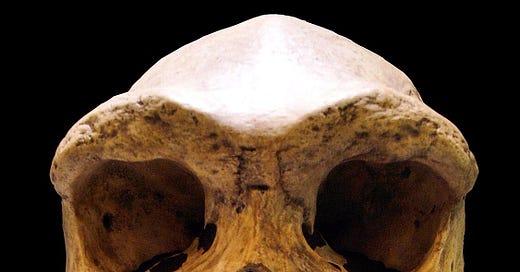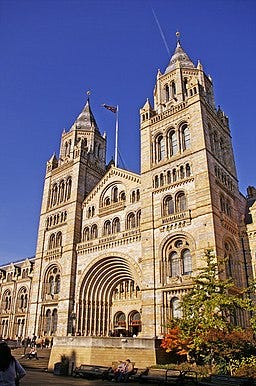Will Zambia ever get back its iconic Kabwe skull from the UK? The nation has considerable international support, but talks have been stalled for years.
The 300,000 year old skull, found in the Broken Hill mine in what was once Northern Rhodesia, has been housed in London's Natural History Museum for a century.
I am now in my 47th consecutive year as a working journalist, and I have lost count of how many articles I have written all this time. During my 25 years as Paris correspondent for Science, I published more than 900 news stories, features, and online reports. My work for dozens of other publications over the years must make up at least several hundred more articles.
One of the unfortunate downsides of modern journalism is that unless a reporter is covering an ongoing story closely, we often do not get the chance to follow up on our original reports, even when the subject matter is important and of public interest.
Almost exactly six years ago, I wrote a report for the anthropology magazine SAPIENS about the attempts by the government of Zambia to get back the famous skull of an ancient human. It had been dug out of the Broken Hill mine, near the city of Kabwe in what was then Northern Rhodesia, in 1921.
The Broken Hill or Kabwe skull, as it is usually called today, has been dated to about 300,000 years old, a critical period during the evolution of modern humans (Homo sapiens.) It was removed from Africa almost immediately and has been housed at the Natural History Museum in London ever since. The skull was, like the Parthenon Marbles and so many other fossils and artifacts, part of the spoils of colonialism, from which former colonial nations continue to benefit.
Zambia has been trying to get the skull back since 1972. My story was about what was then the most recent twist in that effort. As I wrote:
“The U.K. has a reputation for fiercely resisting the return of antiquities acquired during colonial times, especially tourism-generating treasures like the Parthenon sculptures (a.k.a. Elgin marbles) from Greece and the Rosetta stone from Egypt. But last May [2018], at a meeting of the United Nations Educational, Scientific, and Cultural Organization (UNESCO) heritage committee in Paris, Zambian representatives finally broke through British resistance. The United Kingdom agreed to sit down and talk about the possible repatriation of the skull and related fossils back to Zambia.”
This was a pretty big story at the time, and the article in SAPIENS was also published by The Atlantic, Discover magazine, and others. The editors of SAPIENS asked me to keep track of the negotiations between Zambia and the UK, which I agreed to do. But not long afterwards, the publication changed its editorial policy and decided to no longer take contributions from journalists, but only from anthropologists. That was sad, as I had written several articles for SAPIENS that I was proud of, but such is the life of a professional journalist and the prerogatives of magazine editors.
Nobody knows the Kabwe skull better than the museum’s famed human origins researcher Chris Stringer, whom I have known well myself for the past 25 years. For a reason I cannot now recall, I recently began wondering what had ever happened with those discussions between the UK and Zambia. Chris put me on to John Jackson, the Natural History Museum’s Head of Science Policy and Communication, who gave me the following update:
“This is unresolved and the issue is likely to continue to be raised at UNESCO and with the UK government by the Zambian government. There was a meeting of the ICPRCP last year at which Zambia received wide support for its position: the diplomats maintain low key contact. The UK remains open to bilateral discussion (we hosted discussions in 2023) but it is difficult to see how matters might progress at the moment. I think it possible that we might have further engagement with Zambia during this year but have little other than a gut feeling on this. I cannot see Zambia deciding to withdraw this case.”
The acronym ICPRCP stands for UNESCO’s “Intergovernmental Committee for Promoting the Return of Cultural Property to its Countries of Origin or its Restitution in case of Illicit Appropriation,” a real mouthful. But the name of the committee provides a pretty good description of what it is all about.
The meeting last year that John Jackson mentions took place between May 29-31 at UNESCO’s headquarters in Paris. A number of things were discussed, including Zambia’s continued claims for the Kabwe skull. According to the minutes of the meeting, the case had been discussed in 2022 before the committee, and the UK and Zambia met in April 2023 in London to discuss it further. But no agreement was reached—not even close, it appears—in large part because the UK insists that British law does not allow it to be returned, nor does the UK government plan to amend the relevant law.
Yet the British have also taken the position that the Natural History Museum is independent from the government, and thus the trustees of the museum would have to make the decision. But there is nothing in the minutes, or in what Mr. Jackson told me, to indicate that the trustees have taken up the matter; all of the negotiations are taking place between the two governments.
The ICPRCP Secretariat had convened several meetings between the two nations in in 2023 and 2024, but Zambia’s repeated request to receive proposals for the return of the skull by the UK have gone unfulfilled so far.
Nevertheless, at the meeting in Paris last year, Zambia received strong support from the other 21 nations in ICPRCP for its position. A detailed description of what happened, and video of what the Zambia delegation had to say, can be found at this Facebook link, which includes a report from a Kabwe radio station (this is the most detailed account of what happened at the meeting I have been able to find and is well worth reading.)
The saga of the Kabwe skull was used as a case study in a very interesting paper published in 2022 in the Santander Art and Culture Law Review and which I highly recommend. The authors argue that the traditional separation that considers archaeological artifacts as cultural objects belonging to a nation or people, but fossils as belonging to all of humankind, is not valid, especially in the context of colonial history where powerful nations hauled both artifacts and fossils out of Africa and other continents and stuffed their museums with them.
(The authors also give the example of dinosaurs for which rich men have paid millions to keep in their personal possession or at most “loan” to museums for display.)
Indeed, the Zambians have made their own arguments for why the Kabwe skull is so important to their culture and national identity. As I wrote in SAPIENS (forgive me for quoting at some length:)
In recent years, Zambian researchers and cultural officials have left a paper trail of detailed and eloquent arguments—citing moral grounds and international law on cultural artifacts and human remains—for the return of the Kabwe skull. In many ways, the case for repatriation echoes that made by Native Americans under the 1990 Native American Graves Protection and Repatriation Act, which provides for the return of artifacts and human remains under certain defined conditions.
Key to Zambia’s position is a colonial law from 1912 called the Bushman Relics Proclamation. Zambia interprets the proclamation to mean that no cultural artifacts or human remains could be removed from Northern Rhodesia without a permit from the British South Africa Company, which at that time was chartered by the British government to administer the protectorate. The Zambians insist that no such permit was ever issued to the Broken Hill mining company when it donated the skull to the British Museum.
In a 2013 paper in the African Archaeological Review, which chronicles some of this history, Zambian historian Francis Musonda contended that the removal of the skull from Zambia occurred in a colonial context that is anachronistic today. (Greece has made similar arguments for the return of the Parthenon sculptures housed in the British Museum.)
“African people find it unacceptable for a British institution to provide a repository for an African fossil when they themselves have the capacity to do so,” Musonda wrote. “This has put the country in an embarrassing and awkward position because of the impression created that it is incapable of looking after its own hominin fossil.” And even if the conditions in Zambia were “not ideal,” Musonda argued, “why not assist the country in creating conditions deemed suitable for the object?”
Most readers will be aware of the long-standing requests (and sometimes demands) by Greece to get the Parthenon sculptures back from the British Museum; anyone visiting Athens will probably know that Greece has a museum already built and ready to display them, and in much better context than is currently the case in London.
Any suggestions that Zambia is not capable of preserving and protecting the Kabwe skull while allowing African scientists to study it would be, frankly, racist. So it seems that the only excuse the UK has for hanging onto the skull is colonial prerogative, in a world and a time when colonialism is (almost) over, and certainly thoroughly discredited.
In the original SAPIENS article, I quoted a number of Western human evolution experts to just this effect. I appreciated that the editors allowed me to show a little bit of bias in my reporting on the controversy. As should be clear here, I am showing a lot of bias right now. After more than a century, it’s way past time for Zambia to get back its iconic skull. The UK has held onto it long enough.
********************************************************************************************************
To share this post, or to share “Words for the Wise,” please click on these links.






The decision to dispense with journalists was definitely a short-sighted call. I still get email notices on content from Sapiens and poke in on the zine now and then when some subject catches my fancy. The writing, fact-checking and overall choice of articles usually proves disappointing. Glad you picked up the Kabwe thread again!
At the time of its discovery, Zambia was a protectorate of the UK. I am unsure of the legal distinction between a protectorate and a colony, but if it had been a colony, then it was legally part of the UK, in which case it was a fossil found on British land. I do not endorse colonialism, but you cannot rewrite history. Morally, even if Zambia equalled the UK at the time, it would be gracious and appropriate to display the fossil near the findspot.